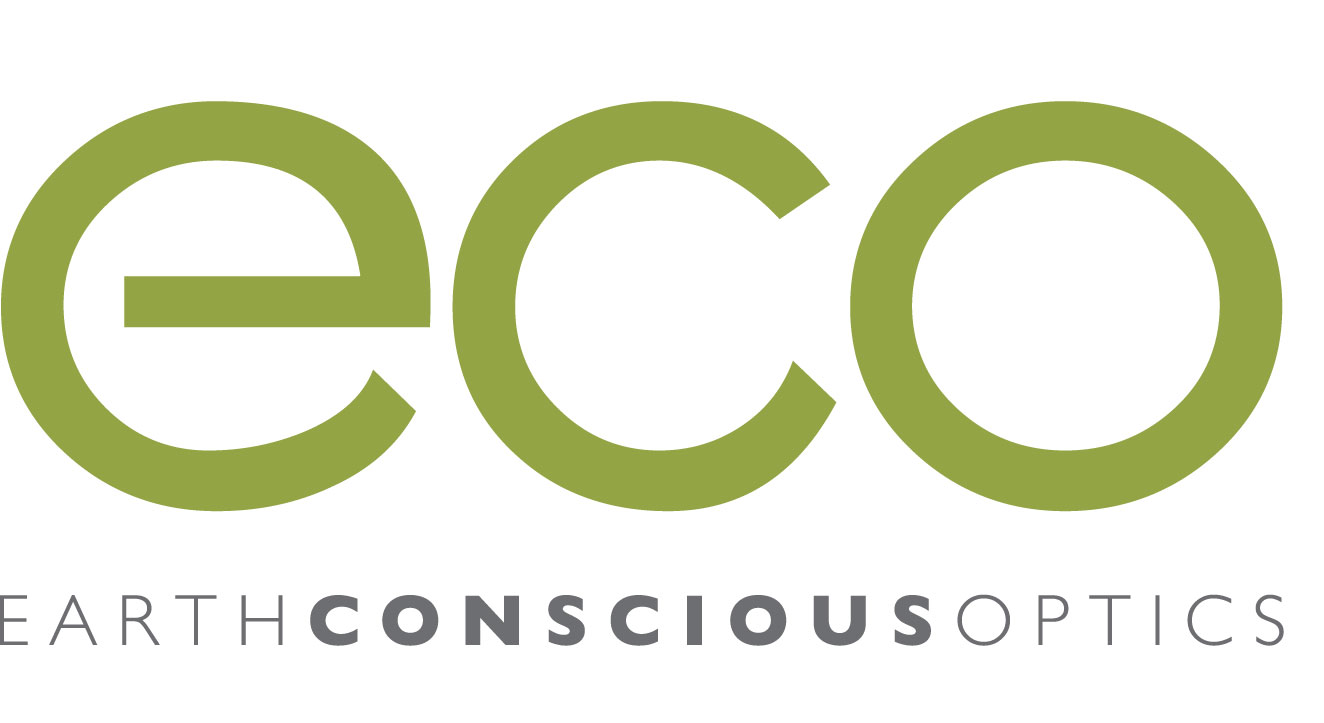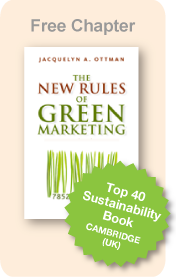Jacquie Ottman's
Green marketing Blog

Running On Human Power
Posted on July 11, 2011 by Jacquelyn Ottman
While researchers are  looking to the sun, the wind and even ocean tides to source renewable energy, some have found an answer much closer to home: the gym. This notion dawned on the owner of a string of gyms in Hong Kong, who rigged cycling and cross-training machines to power a gym’s lights and store extra energy in batteries for later use.
looking to the sun, the wind and even ocean tides to source renewable energy, some have found an answer much closer to home: the gym. This notion dawned on the owner of a string of gyms in Hong Kong, who rigged cycling and cross-training machines to power a gym’s lights and store extra energy in batteries for later use.
The Human Power Trainer, made by Windstream Power LLC of North Ferrisburg, Vermont, works on the same concept. It mounts a …Read more...
Green Marketing 3.0 Can Re-ignite Interest in Green
Posted on November 15, 2010 by guest blogger, Jeff Dubin
Rumors of green’s demise are being greatly exaggerated. In this year of fiery political passions, the word “revolt” is in the air. However, I think Ad Age inhaled a whiff of the zeitgeist and incorrectly applied the term to consumers supposedly cooling in their ardor for green products. “Has Green Stopped Giving? Seeds of Consumers Revolt Sprouting Against Some Environmentally Friendly Product Lines” trumpets the headline of a recent Ad Age article. The author quotes Timothy Kenyon, director of GfK Roper’s Green Gauge study who more judiciously describes the …Read more...
Terrachoice’s Sins of Greenwashing Report—Time for Industry Self-Regulation?
Posted on November 08, 2010 by Jacquelyn Ottman
 Most of you are familiar with Terrachoice’s “Seven Sins of Greenwashing” report. On a webinar aired in late October, CEO Scott McDougall admitted that his firm never intended to be malicious in their use of the term, “sins”. He believes that most of the “sins” of greenwashing being committed today are really not sins at all, but rather, inadvertent missteps.
Most of you are familiar with Terrachoice’s “Seven Sins of Greenwashing” report. On a webinar aired in late October, CEO Scott McDougall admitted that his firm never intended to be malicious in their use of the term, “sins”. He believes that most of the “sins” of greenwashing being committed today are really not sins at all, but rather, inadvertent missteps.
Call me literal, or not a fan of hyperbole, but I believe that calling, in effect, …Read more...
Green Marketing Myopia and the SunChips “Snacklash”
Posted on October 27, 2010 by Jacquie Ottman & Mark Eisen
 Many marketing experts have weighed in on what they believe to be the reasons for the current backlash against SunChips’s new compostable chip package: excess noise. If you somehow missed it, consumers complained so loudly about the snack food’s new environmentally preferable but noisy corn-based bag that the brand reverted to the old packaging for most of its line. Before we blame consumers once again for not sacrificing a little inconvenience for the sake of the planet, let’s …Read more...
Many marketing experts have weighed in on what they believe to be the reasons for the current backlash against SunChips’s new compostable chip package: excess noise. If you somehow missed it, consumers complained so loudly about the snack food’s new environmentally preferable but noisy corn-based bag that the brand reverted to the old packaging for most of its line. Before we blame consumers once again for not sacrificing a little inconvenience for the sake of the planet, let’s …Read more...
Now Even Your Eyeglasses Can be “Green”
Posted on May 27, 2010 by Jacquelyn Ottman
Look for ECOs the next time you shop for eyewear. ECO stands for EARTH CONSCIOUS OPTICS, a new line of eyewear from our client MODO. We are proud to be assisting them in their exciting launch.

ECOs come in all kinds of fashion colors (not just green!) and are made from a minimum of 95% recycled stainless steel or 95% recycled plastic. (Another client of ours, ULEnvironment has validated the claims.) Reflecting a life cycle approach to sustainable design, …Read more...
Hey, Nestle: Don’t Communicate—Eco-Innovate!
Posted on November 20, 2008 by Jacquelyn Ottman
If only Nestle had used good green marketing efforts and communicated its efforts to green its bottled water business sooner, it wouldn’t be in the mess it’s in now. Right? Wrong!
Contrary to what Kim Jeffery, CEO of Nestle Waters, laments to BusinessWeek, the real issue with bottled water lies in consumers’ minds (and the advocates who influence them), not in pricey carbon analyses showing that lightweighting the plastic bottle is the solution to reducing the environmental impact of bottled water. The real issue simply …Read more...
Does a Weak Economy Mean Weak Green Sales?
Posted on October 23, 2008 by Jacquelyn Ottman
Green marketers of every stripe have been asking me: "Will a weak economy weaken sales of green products?" For people who think green products cost more, the answer is yes. To (reverse) paraphrase John F. Kennedy, a sinking sea should lower all boats. And it's still a little early to tell if sales of many green products and services have been hurt quarter to quarter.
The key thing to focus on, however, is how a softening economy might not dampen your own green products sales. In some cases, it just …Read more...
Eco-Logos: A Double-Edged Sword?
Posted on October 22, 2008 by Jacquelyn Ottman
Eco-logos are all the rage - but how valuable are they as a green marketing tool? Are there some hidden risks that warrant a second look? Let's consider the three ingredients of an effective marketing logo - green or otherwise - and their implications for the savvy eco-marketer.
Here are the three factors at play:
1. Recognizability. Eco-logos can reinforce green messages, a welcome benefit for sure. But of the myriad eco-logos on the market, only a few are known to consumers. They consist of the, chasing arrows recycling logo, …Read more...
Déjà Vu All Over Again - Part II
Posted on July 22, 2008 by Jacquelyn Ottman
Last month I discussed some of the green marketing missteps that we keep repeating no matter how many times we should have learned from hard experience that such tactics fall short. I suggested that rather than repeating these mistakes, perhaps the best solution is to move forward with new product innovations that truly transcend green marketing claims and eco-labels.
In fact, pursuing a course of eco-innovation - new product concepts with the potential for significantly enhanced consumer benefits and significantly reduced environmental impact - might be just what the …Read more...
How Far, Pray Tell?
Posted on July 22, 2008 by Jacquelyn Ottman
How far have your products traveled from manufacturing plant or farmer's field to market? Perhaps it's time to tell your consumer. In a marketplace where more and more consumers want to know their carbon footprint, and the marketers themselves are often confused about how to craft their sustainability messages, meaningful, easy-to-understand information is at a premium. Too many think, for instance, that bamboo (which travels 6,000 miles to get to your floor) and fair trade bananas are going to "save the planet," when the truth is that locally procured alternatives …Read more...
Page 1 of 1 pages

